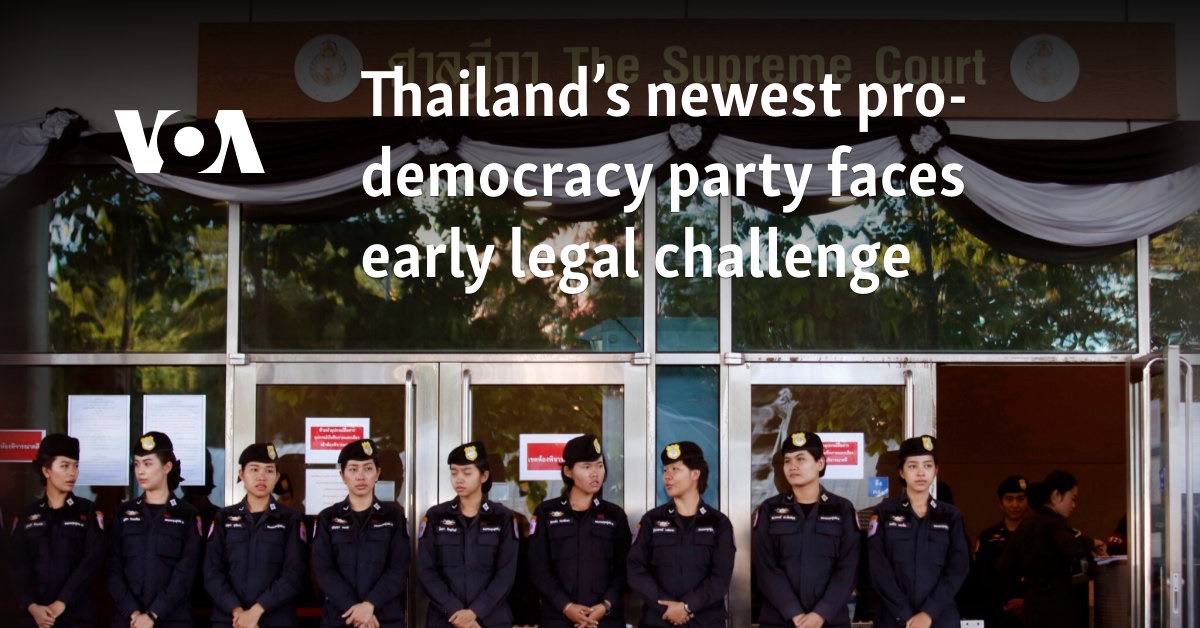The leaders of Thailand’s newest pro-democracy party are facing an ethics investigation that could lead to their expulsion from the National Assembly. The allegations are similar to those that led to the court dissolution of the predecessor party earlier this month.
Thailand’s National Anti-Corruption Commission announced on August 8 that it had ordered an investigation into 44 opposition members of parliament, accusing them of violating ethics rules for MPs by introducing a 2021 bill that would amend the country’s controversial law on defamation of the king or lese majeste.
The announcement came a day after the Constitutional Court dissolved the progressive Move Forward party, which won national elections last year, for pushing for a weakening of the law that allows for up to 15 years in prison for each crime.
The court said the party’s efforts posed a threat to national security, echoing its January ruling that the campaign was a veiled attempt to overthrow Thailand’s constitutional monarchy. The party denied that claim.
All 44 MPs now being investigated by the Anti-Corruption Commission were members of Move Forward. Five of them were barred from holding public office for 10 years in the August 7 ruling that dissolved the party. The other 39 have since joined the People’s Party, which was formed to take Move Forward’s place when it was dissolved. They include its new leader, Natthaphong Ruengpanyawut.
If the commission concludes that the 39 have violated ethics rules, it will refer the case to the Supreme Court, which could also bar them from holding public office.
Analysts told VOA that previous court rulings on Move Forward’s campaign to change the royal defamation law had laid the groundwork for their possible convictions.
“The Constitutional Court has essentially made a ruling that could serve as a catalyst for future rulings against these 44 MPs,” said Napon Jatusripitak, a visiting fellow at the ISEAS–Yusof Ishak Institute in Singapore.
The Supreme Court may, under certain circumstances, apply different procedures than the Constitutional Court and decide to summon its own witnesses, he said.
“But it would be quite an interesting outcome if the Supreme Court ruled in a way that contradicts the Constitutional Court’s ruling, since the Constitutional Court is considered the highest court in Thailand,” he added.
Verapat Pariyawong, who teaches Thai law and politics at SOAS University of London, also pointed to the precedent set by even earlier court rulings expelling the leaders of Future Forward, a progressive party that was dissolved by court order in 2020 and then became Move Forward.
He said the case of Pannika Wanich was particularly relevant. Pannika, a bipartisan MP, was banned from public office for life by the Supreme Court last year for violating ethics rules when she posted a photo online in 2010 that disparaged the monarchy.
“The MPs in this (new) case have not expressed themselves in the same way as Pannika. But they have directly or tacitly supported or agreed to support the bill (amending the royal defamation law). And if the court follows the interpretation in the Pannika case, it could extend the scope of the law to these MPs, thus excluding them,” Verapat said.
Officially, Thailand’s constitutional monarchy is supposed to stay out of politics, but the country’s recent crop of progressive parties and many of their supporters say it has long wielded excessive influence over the government, benefiting the Thai military and conservative elite.
They accuse these forces of using the law against defaming the king as a weapon to persecute parties, lawmakers and activists who seek to keep them in check and move Thailand towards a more genuine democracy.
According to local advocacy group Thai Lawyers for Human Rights, Thai courts have charged 272 people with violating the royal defamation law since 2020.
Move Forward made changing the law to restrict who can file such lawsuits and reduce the maximum prison sentence a central plank of the reform agenda that helped it win last year’s general election. Despite that victory, conservative MPs prevented the party from winning a vote for prime minister in the National Assembly, pushing it into opposition.
The party’s supporters believe that the courts and commissions also carry out the orders of the military and the conservative elite, and the broad wording of some laws and regulations even helps them to implement them.
The ethics rules that the 39 People’s Party lawmakers are now accused of breaking state that officeholders must protect the country’s constitutional monarchy, but analysts told VOA they would provide little detail on what that means, leaving judges wide latitude.
“This requires interpretation because … there is no clear definition of protecting the monarchy,” says Titipol Phakdeewanich, a political scientist at Thailand’s Ubon Ratchathani University.
“And when we talk about interpretation, it always means that if you are in the sights of the elite or the establishment, they could think of anything to decide against you,” he added.
Analysts said the People’s Party also risks being dissolved altogether, as happened to Future Forward and Move Forward before it, if it continues its agenda to amend the royal defamation law.
The party did not respond to VOA’s requests for comment, but at a press conference on August 9, party leader Natthaphong said the party would not act “recklessly” in the matter, hoping to avoid the fate of his predecessors.
Whatever the fate of the new party, the monarchy, or the way in which conservative elites abuse the laws that protect it for their own ends, will continue to be a major fault line shaping Thai politics and dividing the public, analysts say.
“The monarchy issue has been used by politicians who want to ensure that they remain in power,” Verapat said. “It is these people who invoke lèse majesté to attack parties like the MFP or the People’s (Party). So this dynamic will continue as long as … the Constitutional Court can invoke lèse majesté to dissolve political parties.”
Napon said it could also mean that further political difficulties lie ahead for the country, which has experienced 13 coup attempts in the past century and several waves of mass protests, some of them violent, in the past two decades.
“The problem is that it is not clear whether political parties can effectively represent these differences in parliament or in election campaigns because they are limited by law. These issues are considered highly sensitive and are partly taboo for the Constitutional Court,” he said.
“This means that parliament will be very incapable of representing the real divisions in society,” he added. “And that leaves people with grievances that can only be expressed through street protests, which, as we have already seen, have not produced any meaningful results other than… more repression and prison sentences.”



